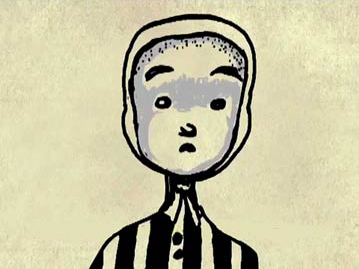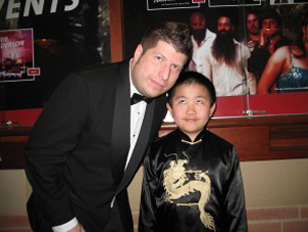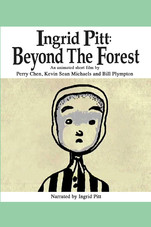Ingrid Pitt: Beyond The Forest

An animated short film by Perry Chen, Kevin Sean Michaels and Bill Plympton
Narrated by Ingrid Pitt
New! Now available on iTunes for download

About the short film
Memories from the Holocaust have been portrayed in almost every medium, but rarely animation -- and never before by a child animator. Animated short film "INGRID PITT: BEYOND THE FOREST" is a cross-generational collaboration between a world-class animation master, two-time Academy Award-nominated Bill Plympton, and a first-time animator, 11-year-old artist Perry Chen. It is narrated by Ingrid Pitt herself.
Starting with Ingrid Pitt's poignant narration and Bill Plympton's 23 traditional pencil sketches as storyboard, award-winning artist and film critic Perry Chen brings this moving story and its contemporary implications alive. Read more
Support the short!
Ingrid Pitt's Voice From The Grave
Explaining the enigma of Ingrid Pitt:
Horror star who survived the Nazi horror
By Jud Newborn, co-author of Sophie Scholl and the White Rose
Actress and cult figure Ingrid Pitt, who died suddenly in London on November 23, 2010 at age 73, was best known and by many adored as "The Queen of Scream" in British horror films of the early 1970's. Her life story is nothing if not confounding and, to some, bizarre.
In the BBC's obituary -- just one of a surprising avalanche appearing worldwide -- Michael Hearn, a historian of Hammer Films, for whom the star worked, described her as "a warm but stubbornly enigmatic figure."
Now Pitt, with the help of the film team of which she was part, will have the opportunity to explain her secret, fittingly, from the grave.
The enigma she embodied can be summed up neatly: how could a woman who experienced the worst horrors of the Holocaust from ages 5 to 8 give herself over so fully to sexualized, violent horror roles? I am serving as historical adviser, co-writer and co-producer of a innovative, animated short biopic about Pitt's experiences in the Holocaust, Ingrid Pitt: Beyond the Forest.
I'm working with twice Academy Award-nominated filmmaker Bill Plympton, visionary director and horror film expert Kevin Sean Michaels (who originated the project), and a widely recognized 10 year old child artist and prodigy, Perry Chen.
Nearly 6 years in the making, and with the full cooperation and collaboration of the star, the film depicts Ingrid's miraculous escape with her mother from the Stutthof concentration camp in January, 1945, and the wondrous coincidence she experienced, while hiding with partisans in the forest, of hearing Winston Churchill's voice proclaiming the Nazi defeat on May 8, 1945 through a radio rescued from a bomber that had just crashed nearby.
As a Holocaust expert, author and pioneer in the creation of modern Holocaust museums, I wouldn't normally have touched this story with a ten-foot pole, given its overtly disturbing and potentially sensationalized dimensions. However, working with Michaels and delving deeply into Ingrid's story and psychology, I now consider it unique, humane, revelatory -- and a privilege to share.
Ingrid recorded the narration, for her an ordeal in itself, only seven months before her death. Never exploiting her Holocaust story in her public persona or to promote her film career, she was haunted by
its horror to her dying breath. She only wrote about it in her fascinating memoir, Darkness Before Dawn (originally published as Life's A Scream) in 1999, long after her film career had waned.
It is almost unbearable to watch Ingrid recount her story on video footage. She closes her eyes, as if at once to remember and shut it all out, visibly trembling and running words together, almost in the manner of the child she had been.
The first clue to solving the discomforting enigma of Pitt's career comes with her break-out role, the mainstream 1968 World War II epic, Where Eagles Dare, in which Pitt played an anti-Nazi agent opposite Clint Eastwood and Richard Burton.
That role was an act of poetic justice, allowing Pitt to help defeat the Nazis in film if not in reality. And yet she also had troubled feelings participating in a commercialized Hollywood treatment of the Nazi era, finding the studio's shameless mercenary attitudes so revolting -- including use of an Adolf Hitler impersonator -- that she once had to flee an in-house celebratory gathering.
Later, when she threw herself avidly into those brazen horror films, usually playing a voluptuous evil vampire or other nasty temptress, Pitt did so with the same resourcefulness and talent that helped her survive the Holocaust. Although she couldn't fully explain it herself, Ingrid used these films to rechannel her pain and utter childhood helplessness into harmless, entertaining, over-the-top fantasies in which she could take control. At the same time she played it all up with campy humor and the exuberance that characterized her whole amazing life.
That life included being trapped in Communist East Germany after the Holocaust; studying acting with the prestigious "Berliner Ensemble" led by Bertolt Brecht's second wife, Helene Weigel -- and running so afoul of the secret police that, immediately before her planned stage debut, she dove into the River Spree dividing East and West Berlin, swimming in full costume to freedom. Pitt's life's solution to her childhood trauma reveals the incredible range of creative strategies whereby many Holocaust victims struggled to survive and go on to live productive and even remarkable post-war lives. This is all the more astounding for so traumatized a child to have achieved.
That is why we use the innovative medium of animation -- imaginative rather than frighteningly explicit -- along with the participation of Perry Chen, a precocious animator nearly the same age as Ingrid was. This approach will help youngsters and adults keep alive the memory of the more than 1,500,000 Jewish and Gypsy children murdered in the Holocaust. It will also instill in them the need to protect all children today from the kind of horrors, oppression and abuse Ingrid Pitt herself had been forced to endure.
With Ingrid's untimely death, which so saddens our film team (especially Kevin Michaels, who knew her the most intimately) we feel all the more obligated to fulfill her last wish and mission: to educate the public about the suffering those in power can inflict upon the most vulnerable among us -- the world's children.

Dr. Jud Newborn, an international lecturer on the Holocaust, served as
Founding Historian of New York's Museum of Jewish Heritage and is co-author of Sophie Scholl and the White Rose, companion to the Academy Award nominated German film of 2006, Sophie Scholl - The Final Days
. He currently serves as Special Projects Curator for the Cinema Arts Centre on Long Island.












